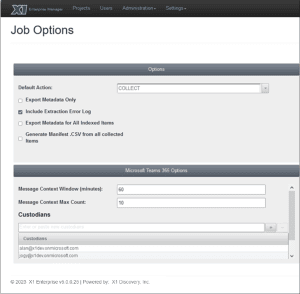Recently, a federal district court in Ohio issued a ruling concerning an eDiscovery dispute involving both Teams and Slack, Lubrizol Corp. v. IBM Corp., No. 1:21-CV-00870-DAR (N.D. Ohio May 15, 2023). This decision is important as it provides and serves as a template and guidepost on how to collect and produce messages from MS Teams, a challenge which many litigants are struggling with today.
This case involves a breach of contract claim where plaintiff Lubrizol corporation, a major chemical manufacturer, purchased an SAP ERP system, and then hired IBM to implement the enterprise software. The project eventually went off the rails and now the parties are in litigation fighting over eDiscovery.
As you might imagine on an IT project like this, there’s a lot of evidence in Teams and also in Slack. Plaintiff Lubrizol wanted IBM to produce the entire channel of their messages if there was even a single relevant message within the channel. However, in its written opinion, the court determined that the production of an entire Slack or Teams channel, with only a few relevant messages within, would be overbroad per the rules of proportionality. IBM conversely took a counter position that was equally extreme, claiming that they only needed to produce the actual message that the keyword hit on without any context of the broader conversation around it. The court rejected this approach.
Eventually the plaintiff came back to the court with a proposed compromise, which the court agreed with and adopted as its final order as follows:
“IBM to produce: (1) the entirety of any Slack conversation containing 20 or fewer total messages that has at least one responsive message; and (2) the 10 messages preceding or following any responsive Slack message in a Slack channel containing more than 20 total messages. Within 28 days, Lubrizol shall do the same with respect to its Microsoft Teams messages.”
While this ruling is very instructive, many parties struggle with executing such a targeted collection and production effort. The problem with Teams discovery, as outlined in a previous post, is that most eDiscovery tools require parties to collect and export entire Teams channels, with the production format being very problematic due to no efficient ability to provide automated and targeted productions as the court outlines above.
The exception is X1. X1 Enterprise Collect provides, in our opinion, the industry’s best eDiscovery support for MS 365. And many independent eDiscovery, experts, agree. X1’s support for MS Teams is one example. Among the reasons why our MS Teams support stands out, is the ability to produce a specific number of preceding and subsequent messages for automated input into a review platform, all in context. See the screenshot below.

Winston & Strawn eDiscovery partner Bobby Malhotra notes the importance of this capability: “With the vast number of users and unyielding amount of data in collaboration applications such as Teams, having the ability to target and triage data by specific custodians and threads allows organizations to handle discovery in an efficient and pragmatic manner. X1 provides the unique ability to seamlessly collect and search across numerous web, collaboration, and social, data sources.”
X1 recently hosted a webinar demonstrating how to collect from MS Teams in an effective, defensible and proportional manner. You can watch it here on demand.
The X1 Enterprise Collect Platform is available now from X1 and its global channel network in the cloud, on-premise, and with our services available on-demand. For a demonstration of the X1 Enterprise Collect Platform, contact us at sales@x1.com. For more details on this innovative solution, please visit www.x1.com/x1-enterprise-collect-platform.
